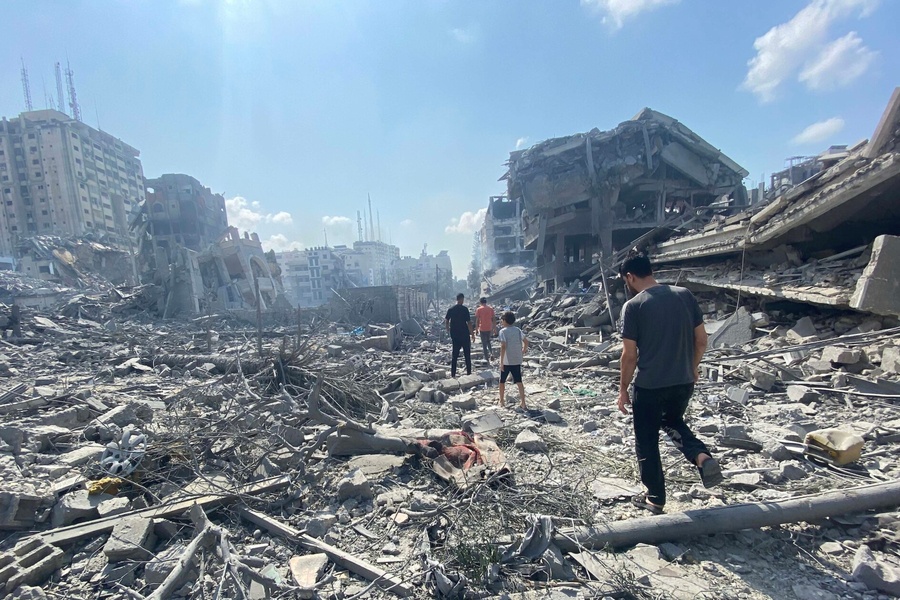Today’s Headlines and Commentary
Lawfare’s daily roundup of national security news and opinion.

Published by The Lawfare Institute
in Cooperation With

Click to subscribe to receive this directly to your inbox.
Ukraine rejected Russia’s ultimatum to surrender the besieged city of Mariupol, reports the Financial Times. The Russian military reportedly gave the Ukrainian government until 5 a.m. Monday morning to respond to their terms and conditions for the surrender of the city. Russian forces demanded that Ukrainian fighters surrender their weapons and warned local government officials that they would face “military tribunals” if they resisted Russian demands.
Mariupol’s city council reported that its residents are being taken to Russia against their will by Russian forces, writes CNN. In a statement, the council wrote “Over the past week, several thousand Mariupol residents have been taken to Russian territory. The occupiers illegally took people from the Livoberezhny district and from the shelter in the sports club building, where more than a thousand people (mostly women and children) were hiding from the constant bombing." Some Mariupol residents being taken were brought to camps at which Russian forces went through their phones and documents. Civilians were then sent to remote cities in Russia. Not all captured Mariupol residents were accounted for, however. In the statement the city council wrote that the “fate of the others is unknown.”
Russian forces shelled a chemical plant in Sumy, Ukraine, and caused an ammonia leak, according to BBC News. Russian shells hit and damaged a 50-ton tank of ammonia, which then created a poisonous ammonia cloud over Sumy. If ingested, ammonia can cause pain and burns into the airway and also cause injuries in and around the eyes. Civilians near Sumy were instructed to remain indoors until the situation was resolved. Local officials later reported that the leak had been contained.
Russian forces attacked a major shopping mall in the Ukrainian capital city of Kyiv on Sunday, reports the Washington Post. The mall was decimated by the blast, which also left at least eight people dead. After the bodies were removed, witnesses at the scene described pools of blood, blood-soaked clothing and used surgical gloves abandoned by medics trying to help the victims. After the attack, Kyiv’s mayor tweeted “This attack on a shopping center is not a coincidence. Putin wants to starve the civilians to make them pressurize their leaders. Let’s pressurize Putin‘s Russia instead. If you continue to do business with them, you have blood on your hands.”
Russian war propaganda is being incorporated into the Russian education system as “patriotic” lessons in Russian schools, writes the Washington Post. Students as young as kindergartens are attending pro-Russia patriotic lessons intended to repress dissent and create an undoubting brand of patriotism through the increasingly isolated country. Students are also taking pictures arranged in the shape of a Z—which is the symbol used on a lot of Russian military equipment and an emblem of support for Russian forces—or in the shape of a V for victory. Russia’s education minister said that Russian schools are a key factor in the Kremlin’s fight to “win the information and psychological war” against the United States and other western countries.
The Biden administration formally determined that Myanmar’s military committed genocide and war crimes against humanity toward the Rohingya minority in the country, according to Reuters. Myanmar’s military—which now controls the country’s government—launched a military operation in 2017 that forced over 730,000 Rohingya muslims out of their homes and into Bangladesh where they were allegedly killed, mass-raped and subjected to arson.
China has fully militarized at least three artificial islands it built in the South China Sea, reports the Associated Press. China has reportedly armed the islands with anti-ship and anti-aircraft missile systems, laser equipment, jamming equipment and fighter jets. U.S. Indo-Pacific commander Adm. John C. Aquilino reported that China’s aggressive actions were part of China “flexing its military muscle” to threaten other nations operating nearby in the South China Sea. Aquilino said “I think over the past 20 years we’ve witnessed the largest military buildup since World War II by the [People’s Republic of China.] They have advanced all their capabilities and that buildup of weaponization is destabilizing to the region.”
This week, the Senate Judiciary Committee will hold multiple hearings on the nomination of Judge Ketanji Brown Jackson to the Supreme Court, writes NBC News. Today’s hearing features opening remarks by members of the committee and Jackson herself—who if confirmed would be the first Black woman to serve on the nation’s highest court. In the coming days, Jackson will likely face questions from Democrats and Republicans about her judicial philosophy as well as controversial topics such as abortion, the second amendment and federal authority to regulate commerce.
ICYMI: This Weekend on Lawfare
Raphael S. Cohen examined the long-term implications of Russia’s invasion of Ukraine on Europe.
Benjamin Wittes explained how Ketanji Brown Jackson’s representation of Guantánamo detainees was a service to the justice system.
Email the Roundup Team noteworthy law and security-related articles to include, and follow us on Twitter and Facebook for additional commentary on these issues. Sign up to receive Lawfare in your inbox. Check out relevant job openings on our Job Board.




-(1).png?sfvrsn=dd820f87_5)
